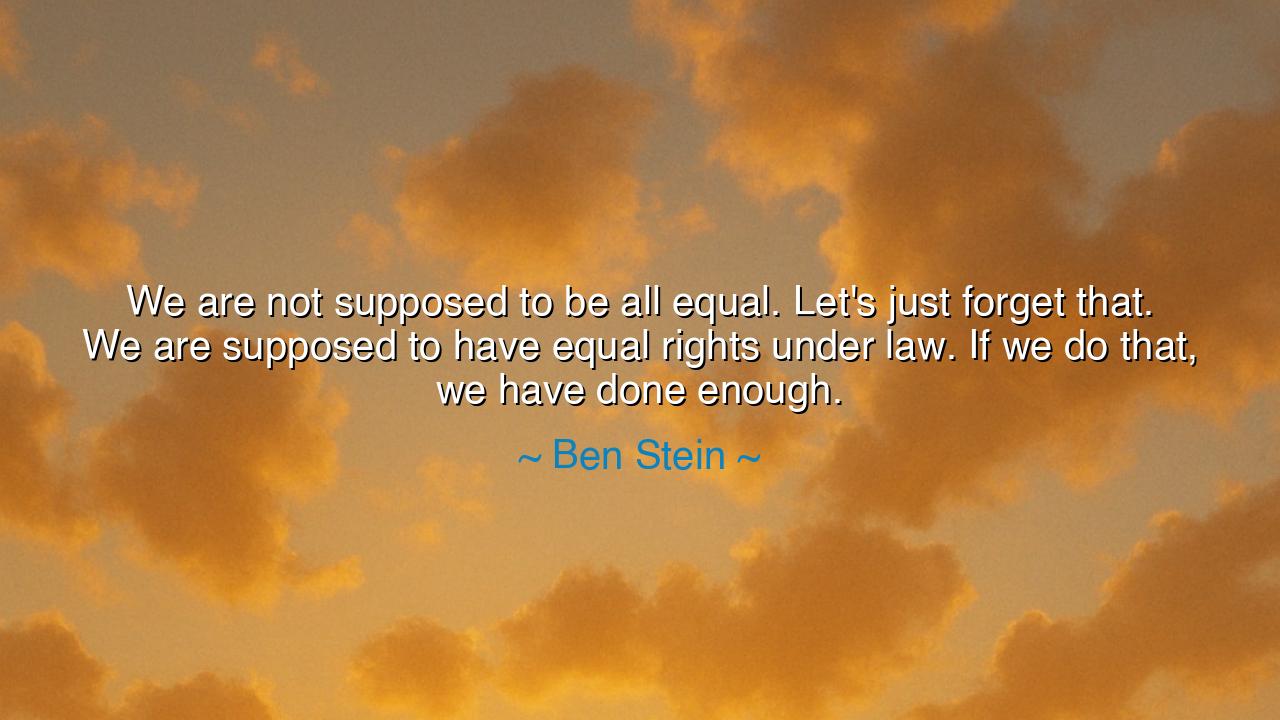
We are not supposed to be all equal. Let's just forget that. We
We are not supposed to be all equal. Let's just forget that. We are supposed to have equal rights under law. If we do that, we have done enough.






“We are not supposed to be all equal. Let’s just forget that. We are supposed to have equal rights under law. If we do that, we have done enough.” Thus spoke Ben Stein, a thinker of the modern world, whose words carry the calm strength of reason and the quiet fire of justice. In this saying lies a truth that the wise have known for ages: that equality does not mean sameness, nor does fairness demand uniformity. Humanity was never forged in one mold—our gifts differ, our strengths vary, our paths diverge. Yet what binds us in the harmony of civilization is not that we are equal in nature, but that we are equal in dignity and in the protection of the law.
In the days of the ancients, philosophers sought to understand the order of the world. They saw that the stars differ in brightness, the trees in height, the rivers in their course—yet each has its rightful place, each serves a purpose in the great design. So too is it with humankind. To demand that all men and women be alike is to deny the beauty of creation itself. But to deny that each soul deserves justice, respect, and freedom is to mock the very laws of heaven. Stein’s words are a call to wisdom—to see clearly that perfect sameness is neither possible nor righteous, but equal rights are the sacred foundation upon which all peace and liberty rest.
Throughout history, nations have faltered when they confused these truths. Some, in the name of equality, sought to make all men uniform, silencing excellence and punishing difference. Others, mistaking difference for superiority, enslaved and oppressed those who did not share their power. Both paths lead to ruin, for both betray the balance of nature. The true equality that Stein speaks of is not equality of condition, but equality of opportunity and protection—the right of every man and woman to live free, to speak without fear, to rise according to their merit and conscience. This is not the false equality of sameness, but the divine justice of freedom.
Consider the story of Abraham Lincoln, who rose from the humblest beginnings to the highest office of the land. He did not seek to make every citizen identical, nor to erase the distinctions of ability or fortune. Instead, he fought for a principle eternal and unchanging—that no man should live in chains, that the law should stand as a guardian for all. When he declared that the nation must have “a new birth of freedom,” he was proclaiming the same truth Stein later echoed: that a just society does not promise equal outcomes, but ensures equal rights. For when the law stands impartial, and when the weak and the strong alike are shielded beneath its hand, then justice reigns, and the spirit of liberty breathes.
The ancients would have understood this. Aristotle himself said that equality among unequals is unjust—that fairness lies in giving to each what is due, according to his nature and his deeds. A farmer and a poet, a craftsman and a scholar—each contributes differently to the world’s good. Yet all must be equal before the law, for the moment law bows to privilege or prejudice, tyranny begins. The strength of a civilization is not measured by its sameness, but by its justice—how it treats the smallest citizen as carefully as the greatest. This is the heart of Stein’s wisdom: equality before the law is the shield of the weak, the restraint of the strong, and the harmony of all.
In our age, many cry for equality in every form—of wealth, of thought, of circumstance—but forget that forced sameness breeds bitterness, not balance. A just society must cherish diversity, for in diversity lies strength. Yet it must also hold firm to the one equality that transcends all others: the equality of rights. When the law is fair, when courts are blind to color and creed, when opportunity is open to merit, then the people may rise in peace. We need not all walk the same path; we need only ensure that every path begins at the same gate.
The lesson, then, is simple yet profound: Seek justice, not sameness. Cherish the differences that make life rich, but guard the equality that makes it righteous. Do not envy the gifts of others, but ensure that all may use their gifts freely. When you see unfairness in law, speak; when you see privilege corrupting justice, resist. For it is not sameness that makes a nation great, but fairness. The measure of a people’s virtue is not in how alike they are, but in how equally they are treated beneath the law’s light.
So remember Ben Stein’s wisdom, children of the future: the world was not made flat, but the law must be. Let men and women rise as their talents allow, but let none be shackled by injustice or denied their rightful chance. For when all stand equal before the law, freedom is complete—and that, indeed, is enough.






AAdministratorAdministrator
Welcome, honored guests. Please leave a comment, we will respond soon